Search results
80 results found.
80 results found.
>In two weeks, Accra hosts an interesting conference, 2nd International Conference on African Culture and Development, ICACD. The program can be found here.
The secretariat of the newly founded organization is placed in Ghana’s commercial hub, Kumasi and it was also there the first conference was held in 2008. A participant, Erica Borgstrom, published her reflections after that first meeting here. She writes:
The conference illustrated precisely how complex the idea of ‘Africa’ is whilst physically demonstrating how competing agendas affect this notion. The premise of ICACD is to be an ‘African Cultural advocate’ to influence policy, placing culture on the broader African development agenda. For its inaugural meeting, ICACD attracted an array of individuals with varying backgrounds and aspirations. Their differing agendas soon became apparent in presentations and discussions. Primarily, this resulted in the (often confusing) multiple and differing use of the word ‘culture’, consequently affecting their attitudes towards an implementation of ‘culture’ in ‘development’.
Africa is not one! Why an initiative like this will not start with the scope of West-Africa – or even Ghana – is beyond me. Because, just like for the AU, geographically broad initiatives that recognize no difference in agendas or set any rules for membership, become toothless.
The second item brought up in the quote above, I also found very interesting since I personally recognize this problem of defining ‘culture’. Being interested in the arts in Ghana, I have been confronted with this often conflicting of interpretations to ‘culture’ – two brought out by Borgstrom are 1) the touristic and sometimes stereotypical “traditional” culture including dancing and drumming and 2) the culture linked to how we choose to live our lives. And then I’d like to add the 3) culture involving all artistic expression, focusing on contemporary expressions, that Borgstrom does not discuss.
However, the issue is critical – what kind of development do we get if culture (whatever the definition might be) is not included? Also, I’m guessing the other executives (I’m the treasurer) of Accra Cultural and Arts Network (AccraCAN) will be there. So, I might steal time away from my regular job to go see if discussions have progressed since last year.
Pic: people and sculptures of people at a vernissage in August at the University of Ghana. Sculptures by the Ghanaian artist Kofi Setordji.
> Today, my article about the conference “Revisiting Modernization” organized two weeks ago by University of California & University of Ghana was published in the University World News/Africa Edition webbased newsletter here.
Just at the opening of the conference, I’m sure you remember I blogged on it here.
> New week, new conference. This time it is the 5th Biennial Conference for the Association for the Study of the World Wide African Diaspora.
The conference, which has the title “Africa, Diaspora, and Pan-African Agendas”, has been going on since Sunday, however unfortunately I haven’t been able to go to every day. In addition to my spotty attendance, about five workshops and panels happen at once so I have probably just experienced a fraction of this year’s conference but what I know for sure, to paraphrase Oprah, is
1. It is the first ASWAD conference on African soil
2. Kwame Nkrumah would have turned 100 years this year
3. We still dont know enough about slavetrade and its consequences
4. Diasporan and African studies need to converge for any Pan-African agenda to progress
And finally and most uplifting:
5. A new generation of Pan-Africanists is emerging!
In the pic, the new generation of Pan-Africanists (including Robtel Neajai Pailey, Carina Ray and myself) listen to one of the old-school activists, Jaqueline Ki-Zerbo.
Today, I visited the official opening of an academic conference, Revisiting Modernization, which is organized as a collaboration between Institute of African Studies at University of Ghana and University of California. I am covering the conference for University World News, will post the article in this space once it is done.
Not only does the conference have a very interesting program – it is open to the public. I am especially recommending their evening programs, the standard was set tonight with a superb dance performance (again a Ghana-US collaboration), tomorrow we can look forward to an art exhibit and on Wednesday a film screening with films such as Baby Ghana, one of the first films recorded in this country!
The conference is the first in a series of three planned in Africa. After this one comes Senegal in 2011 and South Africa in 2013!
> Why do people want to crash parties, when it is CONFERENCES that have it all? Useful information, coffe and cake, beautiful people, drinks and give-aways, fun power-point presentations given by Americans, as well as those contacts you need to move forward in life?
Why do people want to crash parties, when it is CONFERENCES that have it all? Useful information, coffe and cake, beautiful people, drinks and give-aways, fun power-point presentations given by Americans, as well as those contacts you need to move forward in life?
Next time a cool conference is in town, here’s what you do:
• Go to the venue on day 2 of the conference, or after lunch on day 1, then security and staff is more relaxed.
• Be dressed up, but conservatively, don’t wear anything that attracts special attention.
• Wear a big scarf around your neck. It could be hiding the conference badge you..ehrm.. do not have. If someone still should ask for your non-existing badge, maybe in order to let you in to the lunch buffet, you have accidentally left your badge in your office. So typical. Sigh.
• If possible, follow the crowd. If crowd is unavailable, walk confidently to the information desk; ask of the room for the ‘morning/afternoon plenary session’.
• Network as much as you can, but don’t give business cards – take cards and promise to email or call (then you can do the screening).
• Ask a question when the floor is being opened for Q&A, no one will think an intruder does that.
• Always use your real name and organization, otherwise future contacts will be difficult.
• If an important person, like say the Vice President of Ghana, comes by, be sure to shake hands. Maybe even smile.
For more daring people:
• Thank the organizers for a wonderful event using their first name (look at their badge). “Dear Margret, I’m Kajsa Hallberg, thank you for a great couple of days!”
For less daring people or people who plan ahead:
• Call or email the organizers in advance explaining that you are interested in the conference, but you/your organization cannot afford it. Do they let NGO’s in for free? Do they need help preparing the venue/the conference folders/the coffe breaks?
And remember, it is easier to be forgiven than allowed.
At the end of 2018, I sat next to a man in a crowded auditorium at University of Ghana for the International Communication Association Africa conference (ICA Africa). I introduced myself and after the opening keynotes (Ghanaian Vice President Bawumiah and Cameroonian Professor Nyamnjoh), we couldn’t help but debrief together on how interesting it was. The man I was talking to was Communications Professor Kehbuma Langmia of Howard University. As we stood there, I told him about my work at Ashesi University, he attended my Policy Lab presentation on Internet Freedoms, and later invited me to contribute a chapter to a book he was putting together. Now the book Digital Communications at Crossroads in Africa: A Decolonial Approach is out!
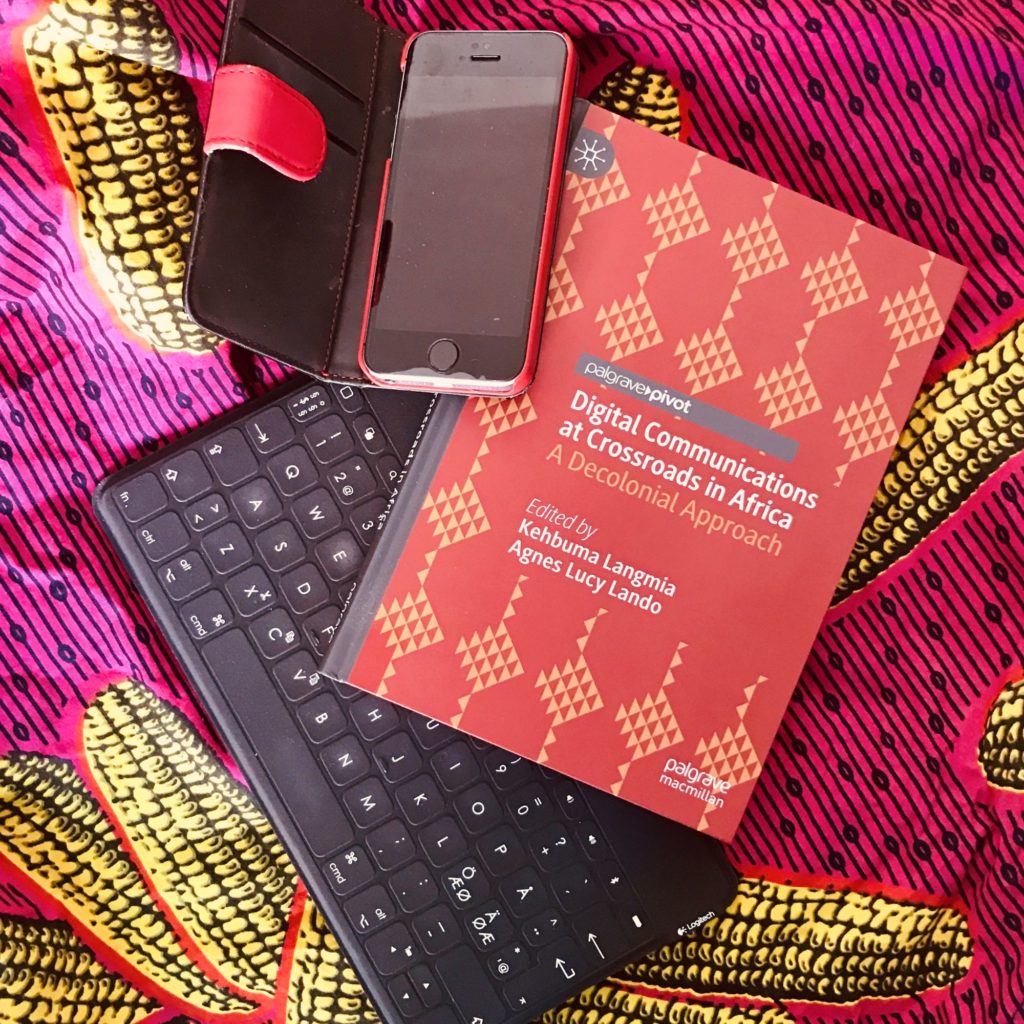
In my chapter, Digital Communication Tools in the Classroom as a Decolonial Solution: Pedagogical Experiments from Ashesi University in Ghana, I argue digital communication tools like Twitter and Wikipedia can decolonize not just minds, but classrooms too, as the tools support students and lecturers together to rethink, reimagine, and reshape knowledge production.
In the chapter, thought hard about the idea — at this point-in-time almost catchphrase — “decolonizing the university” and what it really means, like HOW do we DO it? As part of understanding the many possible meanings, I outlined five aspects of decolonizing the university. I deduced it is ultimately about sharing power with students, examining implications about what we include and exclude in our classroom conversations and course outlines, changing the content, providing epistemological access, and finally decolonizing also the institutions.
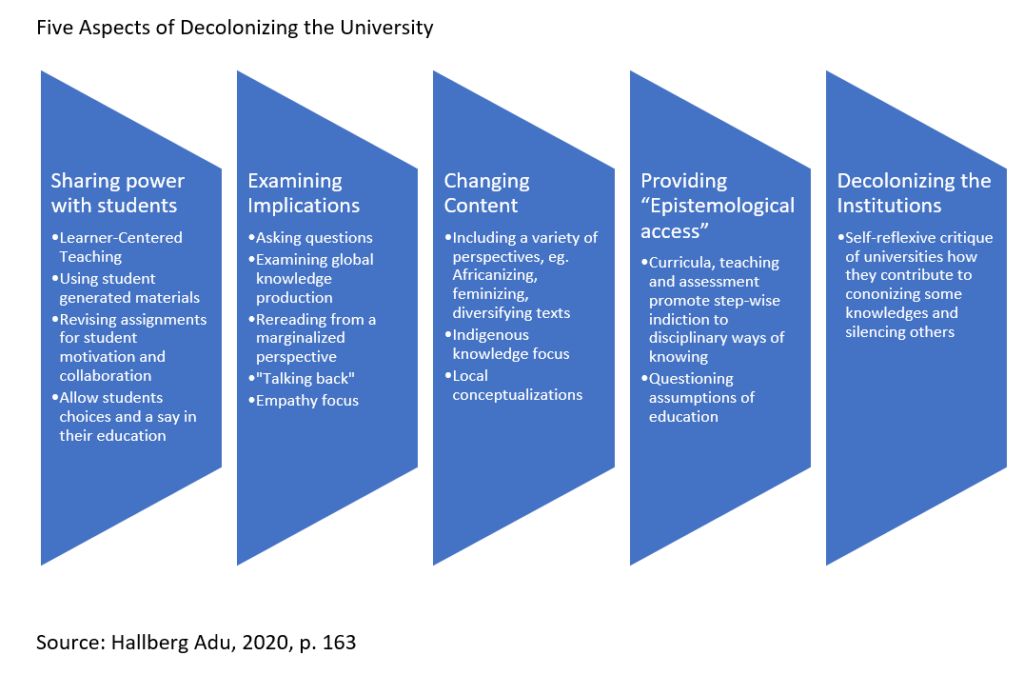
After arriving at these five aspects of decolonizing the university, I wanted to say something about how digital communication tools can address or bridge these aspects. See figure below.
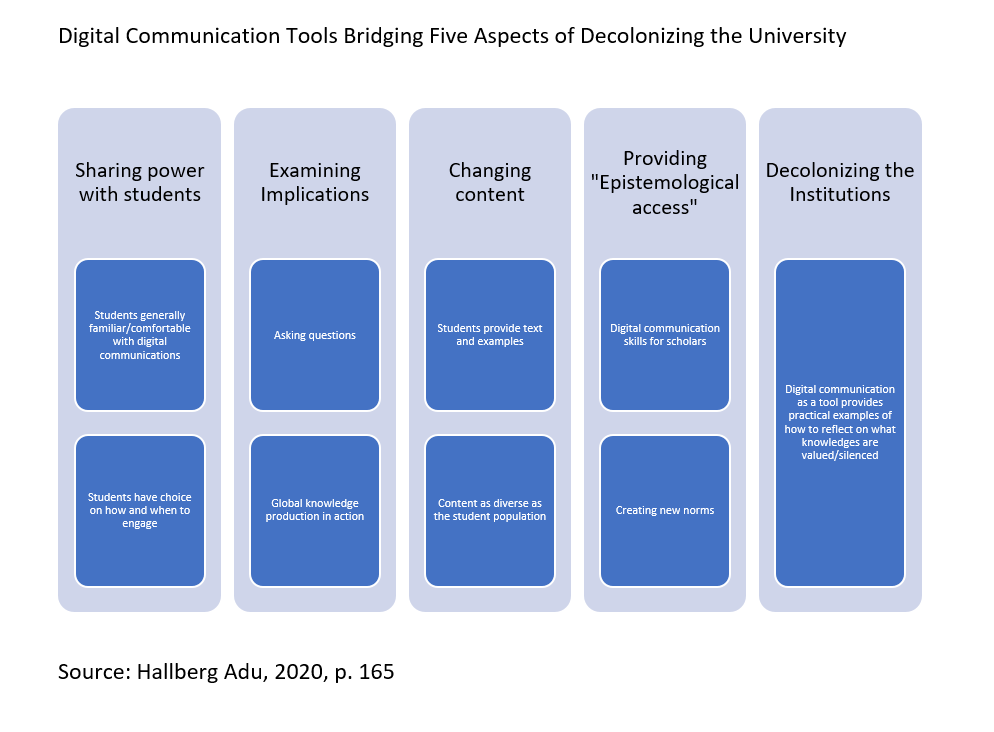
If you click on the linked button below, you can get a preview of my chapter.
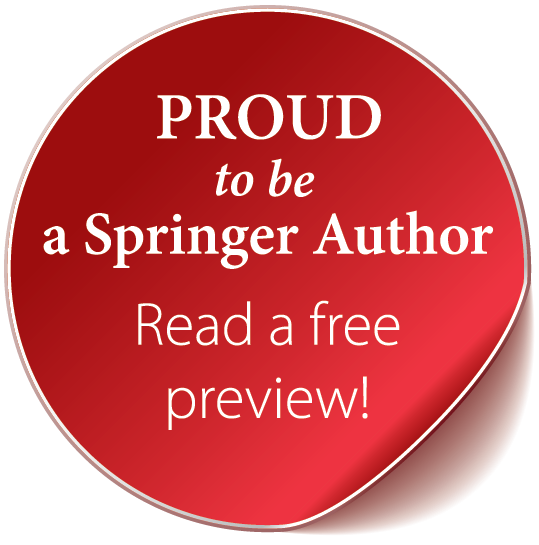
I would love to hear what you think of my ideas and the operationalization of decolonization of universities into five aspects. What did I overstate or miss entirely? Do you agree digital tools can be of help or are they merely new, sexier methods to further colonize the world-at-large by the few?
I would like to thank the editors of the volume Dr. Agnes Lucy Lando of Daystar University, Kenya and Dr. Kehbuma Langmia for open arms and good collaboration, Open Foundation West Africa for assisting with Wikimedia in the classroom, and colleagues and students at Ashesi University, Ghana.
For the Ghana Studies Association conference with the theme “Ghana as Center”, I decided to make a dream come true and make a documentary about my hometown for 12 years – the city of Tema.
The film “Tema Life: City of the Future” will be presented in a panel about Tema – the city that geographically is the center of the world.
The panel is in Room 1 at 2.30-4pm on Friday 12 July, 2019.
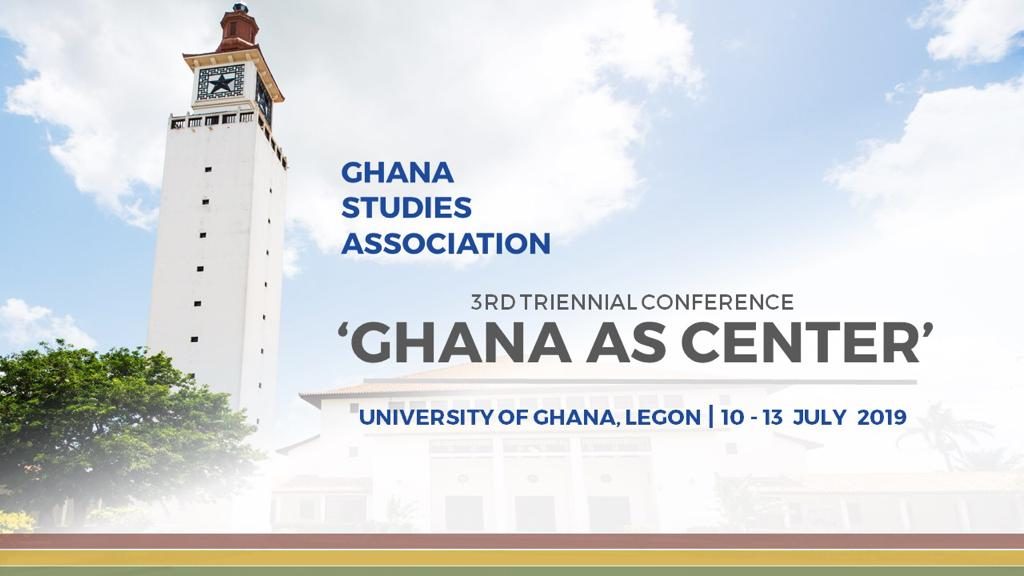
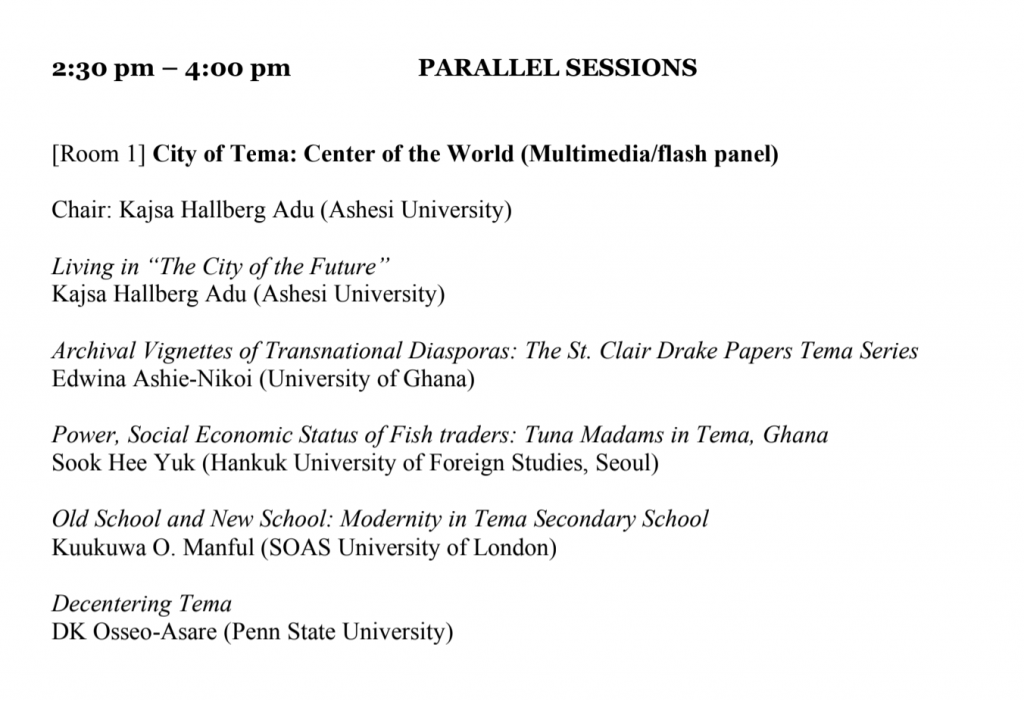
Here is my writeup about the documentary:
The city of Tema was planned and constructed in the late 1950s and early 1960s as a central part of Ghana’s modernization project. Buildings and areas were purposely designed for industrial, residential or business purposes according to the modern planning ideas of the time as well as socialist ideology. Original inhabitants were moved. The industrial model town was populated by foreign and local workers. By 1960 the city and surrounding areas had 25 000 inhabitants and ten years later just shy of 100 000. The industrial model town had various industries: textiles, radios, soap, motor vehicles, food stuffs, cigarettes and so on and was populated by foreign and local workers. The city was constructed “to be the city of the future” (Ahlman, 2017).
Tema was politically and economically central – in addition to purposely geographically constructed in the Greenwich meridian before it hits the ocean. Later political and economic pressures, including geopolitical changes and the growth of Ghana’s nearby capital Accra and its industrial areas and Tema became peripheral.
This project seeks to collect narratives from the first dwellers in Tema in a documentary film. Young laborers in 1960 would today be in their 80s and hence the time is running out to capture their oral histories about Tema then and now. The narratives will focus on what work, leisure, shopping was like during the early days of Tema and offer Tema’s first inhabitants a space to reflect on how it has changed. Building on the Nana Project by Kirstie Kwarteng that seeks to collect oral histories in Ghana, the conversations will be professionally filmed and the output will be a short documentary and a journal article analyzing their oral histories about the center of the world, Tema.
The team behind the film is scholar Kajsa Hallberg Adu, PhD and filmmaker Mantse Aryeequaye who bring together knowledge of Tema and of documentary film in Ghana. Mantse is a cultural producer and filmmaker perhaps best known for his championing of the street art festival Chale Wote in Accra. He is however also a longtime music and film producer who has worked all over the continent with companies such as MTV, Studio 53, Moonlight Films in Capetown, The Africa Channel, and currently serves as director of Reddkat Pictures and as the co-director of AccraDotAlt.
Ahlman, J. S. (2017). Living with Nkrumahism: Nation, State, and Pan-Africanism in Ghana . Athens, OH, US: Ohio University Press.
Saturday, June 1st, 2019 will be my last graduation as a lecturer at Ashesi University in Berekuso. After the summer, I will explore a new path in my career journey.
I have been an employee at Ashesi University since August 2009, I even experienced the ground-breaking ceremony for the Berekuso campus! I can look back on 10 years of joy, incremental learning and meaningful meetings on two different campuses. I’m thankful for the opportunities I’ve been provided and I have been proud working for the important mission of Ashesi University – to educate a new generation of ethical and entrepreneurial leaders in Africa – if even in a small way in the classroom and in off-campus interactions. See some photos in the gallery below.
Over this past decade, I have written many blog posts about my time with Ashesi University, here are some of them: Teaching a summer course humbly called Thinking Like a Genius! Fall semester 2012 teaching Written and Oral Communication and Text & Meaning, Teaching Social Theory 2012. Career Fair 2013 (with photos). Reading Mahama’s biography for Social Theory class 2013. Doing a “Grown Woman Internship” with Citi FM. About Ashesi students being cool! Passing on the baton of teaching from my mother to my daughter(?). Getting extremely excited about Virtual Reality in the Classroom in 2016 (now Ashesi alumni led company Nubian VR are doing research on how science instruction in Ghanaian high schools can use VR technology). Having a writing team kickoff and welcoming new talents. On my fav assignment personal artefact speeches in 2018. On my sabbatical – time to think, read and write in 2019.
I also wrote an article for Swiss newspaper NZZ about Ashesi’s approach to ethics which was published in English for University World News as well.
Recently to my joy, two of my students started blogs of their own. Do also read: Theresa on getting a Visa for her study-abroad when the time was running out, and Masateru on helping his family’s cake business in Malawi with the skills he picked up at Ashesi University. Alumni Karyn went to Sweden for a Master’s and won the Global Swede award!
So on Saturday, it will not just be Class of 2019 leaving the Ashesi community – I will be clasping my handkerchief and remembering the good times as well! Thank you to all fantastic individuals: students, colleagues, alumni, parents, support staff, foundation folks, board members, friends, all who have crossed my path at Ashesi since 2009!
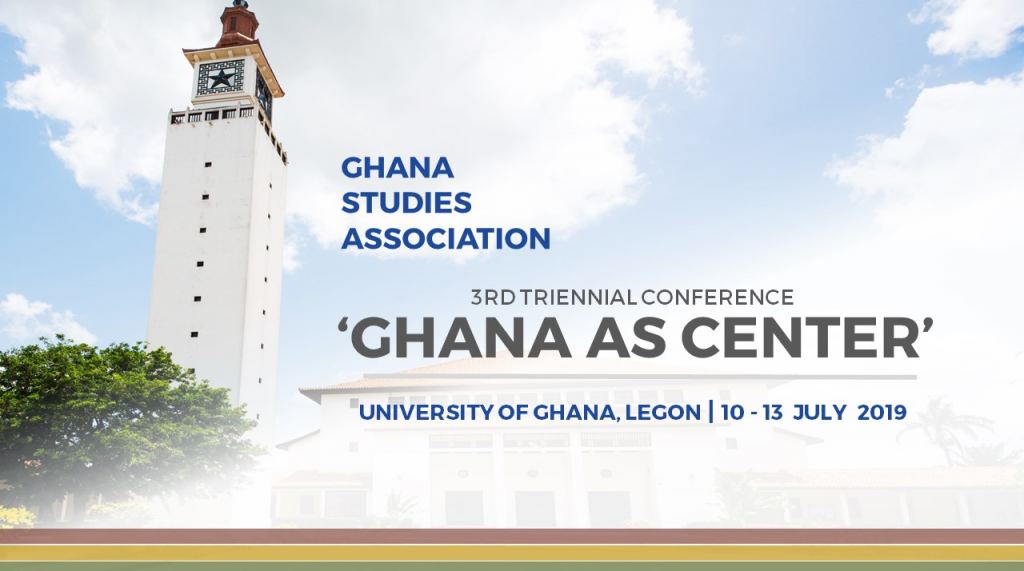
The Ghana Studies Association is organizing its triannual conference this summer and together with two fabulous colleagues, DK Osseo-Asare and Kuukuwa Manful, I am organizing a Visual Roundtable with Flash Presentations. If you are a researcher who has taken an interest in the city of Tema, Ghana (an extremely interesting space, if I may say so myself as an inhabitant since 12 years), do apply to join us, details below!
City of Tema: Center of the World
While the harbor town of Tema geographically is the center of the world as it encompasses the Greenwich meridian and is the closest landmass to the equator passing Ghana in the ocean, as a planned urban space it also can be understood as central to Ghana’s historical modernization efforts and hence nation building.
In the words of Nkrumah at the official opening of the Tema Harbour, Tema “represents the purposeful beginning of the industrialisation of Ghana”. From the late 1950s to mid 1960s, Tema, true to intentions was both a symbol of and an experiment in modernity and modernisation. Furthermore, Tema was a global city interlinked with the global community through the siting of multinational companies, internal and international migration as well as the harbour which was a hub for West Africa. Paradoxically, the proximity to the capital Accra made Tema peripheral in certain ways and this was exacerbated by the downfall of industries and the decline of Nkrumah’s modernisation project.
What is Tema today and what are unique experiences of Tema like? Is it still central to Ghana, West Africa and the world? What are the contemporary (legacies of) expressions of modernity in Tema?
This session aims to discuss the centeredness of the town of Tema as part of a local and global network of ports and places, from both a historical and contemporary perspective – with a focus on lived experiences, urban planning, design, art and architecture, borders, boundaries, commerce, the state, and transnational entities.
This 90-minute session welcomes 5-minute flash presentations with up to 10 slides and will include a closing conversation making it a visual roundtable.
Chairs: Kajsa Hallberg Adu, Ashesi University; Kuukuwa Manful, SOAS University of London; DK Osseo-Asare, Penn State.
Please submit your flash presentation or a 250-word abstract by email to khadu@ashesi.edu.ghby 27 Jan
I am lucky enough to work in a sector where there is a tradition to allow a block of time every 6-7-8 years of employment to focus on research. The time has come to me and this spring, Jan-May, I will be 100% focused on thinking, reading,
It is exhilarating – so much potential! – and scary. I am worried I will somehow squander the time, get derailed by emails, or just get less productive when the walls of
Three weeks into the sabbatical, I am still a bit worried, although have read much more research already than I did all of last semester, and asked senior colleagues for help and guidance. I am also walking more, both to lessen the anxiety and to think better. But should I continue to work from my house with all distractions that come with it or should I find an office space away from home? For now, I am taking up colleagues on their offers of co-writing sessions and paying a short-term visit to a research environment in Sweden for focus and inspiration.
Potential Outputs
What would you do if you had five months of work time to plan yourself?
The fall semester has just started and that means it is like a new year for us academics. I have decided to go back to a paper calendar to make sure I do not overbook myself (when the space for a day is filled, my day is filled!). However, September was slightly overfilled anyways. But with some great events:
Nordic Africa Days is a biannual conference organized by the Nordic Africa Institute. It is my “home conference” as a Swedish researched in Ghana and I have been attending since 2007!
This year, I organized a panel session with my colleague Michael Boampong called Conceptualizing Youth Mobilities and presented a paper within it.
Next Einstein forum contacted me about moderating a panel which proved to be very interesting where industry representative Ethel Cofie or Women in Tech/ Edel Consulting Ltd met education representative Dr. Patrick Arthur from University on Ghana on the gap between STEM education and industry. Some highlights from the conversations:
Very meaningful panel on science and education at Ghana STEM Conference. Great points by Dr @PAKARErst & @ethelcofie. The moderator is Dr @kajsaha pic.twitter.com/QWh5WAskvq
— NEF Africa Science Week – Ghana (@aswghana) September 28, 2018
#NEFScienceWeek
Forum for Internet Freedom in Africa organized by CIPESA and MFWA is something I luckily happened to come across as I was doing research for a new project I have initiated on Internet Freedom and Internet Shutdowns. It turned out the experts were on their way to Accra! The same week as finding out about this conference, I was able to join its last afternoon. It was a fantastic networking opportunity and the sessions I visited launched reports like The State of Internet Freedom in Africa and the Internet Universality Indicators, discussed how to measure Internet Shutdowns and how to advocate effectively for them not happening.
On Friday, I stopped by #FIFAfrica18 to learn more about Internet Freedom, see here the photo evidence (it is me and my short hair in front of the panel). It was a great panel, glad I sat in front! https://t.co/Vhip5lGaCZ
— Kajsa Hallberg Adu (@kajsaha) October 1, 2018
Another fantastic session I was able to learn in at #FIFAfrica18. Find the indicators mentioned here: https://t.co/nLBDhBlbwz https://t.co/SFV3efODoz
— Kajsa Hallberg Adu (@kajsaha) October 1, 2018
The Merian Institute for Advanced Studies in Africa funded by the German government had its inaugural conference at University of Ghana – I only made it to the very final and concluding session. The institute has planned for some interdisciplinary and interesting studies investigating big issues, from the concluding presentation, however, I worry that the research groups and methods seemed to already have been decided in Germany and that could mean the so-called collaboration in actual fact is only a satellite department of a German institution coming to Ghana. I hope I am wrong…
…is that beautiful blue book with gold details. On the inside it gives me a full week’s overview and just enough space to list my meetings and main to-dos for each day. I realize it is less stressful to have a finite space for planning my time.
How do you make sure your days and weeks are not overfilled, but allow for quality work and breathing pauses?
Last week, I was a speaker at the Yielding Accomplished African Women (Yaa W) Program. It is a summer program for Ghanaian female university students, including some of my own students from Ashesi University – that serves as a Finance and Technology Accelerator!
The program is the brainchild of Diana Wilson (in the first photo with me below), a graduate of University of Virginia, who has a truly interdisciplinary or even liberal arts background of studying Sociology, Women lib studies and Finance. In her commerce internships she saw a gap of assertive black women and decided to do something about it. During her senior year of college she has enlisted colleagues to help her out and this summer it happened. Read Diana’s statement about the leadership program she created named after Yaa Asantewaa here. What if more people were like Diana? What a wonderful world it would be…
I have been thinking a lot about the talks I do outside of work and how to make sure they are impactful and also rewarding for me. I think maybe I will insist in the future on longer sessions such as the 3 hour session I did with Yaa W and smaller groups. I very much enjoyed talking to the young women in the program about wellness-work-love-fun-development balance (borrowed heavily from OneStep’s Success audit), love-bombing over criticising, and elevator pitches / first impressions.
I was happy to be able to assist in a mission I believe in and felt after a halfday of leadership discussions I had made 10 new friends!
What talks do you happily give outside of work?
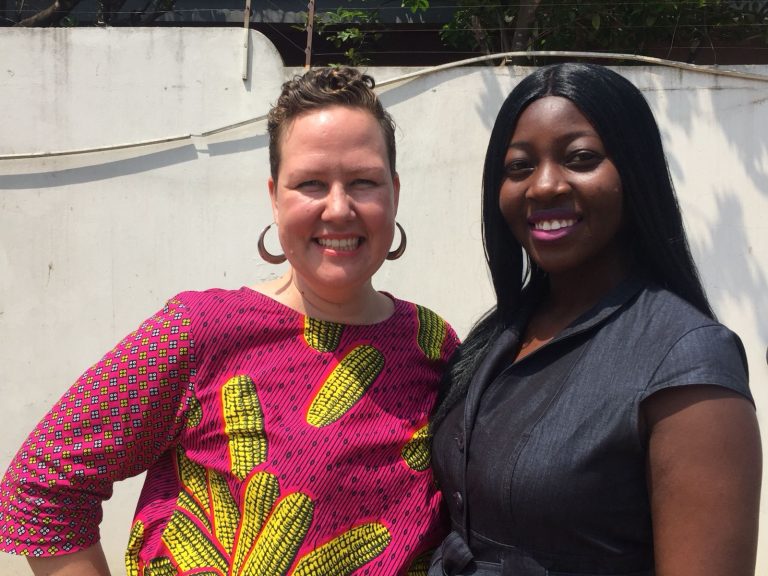
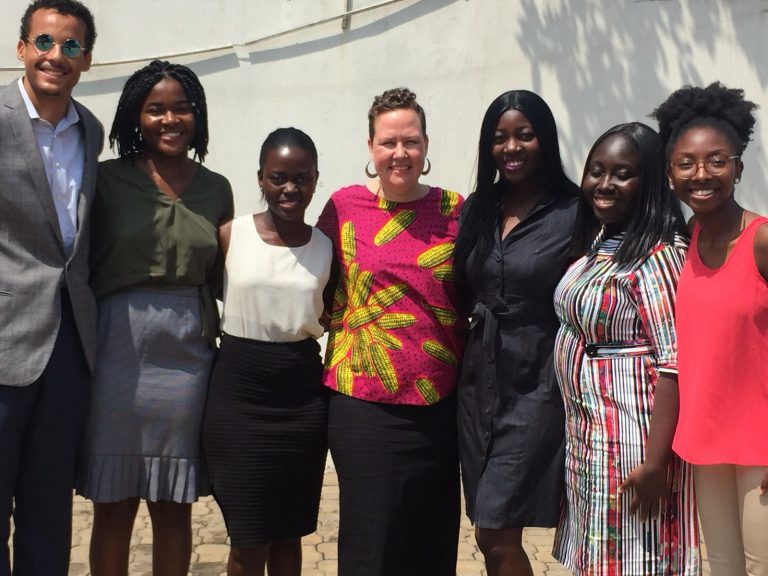
With Diana and her team.
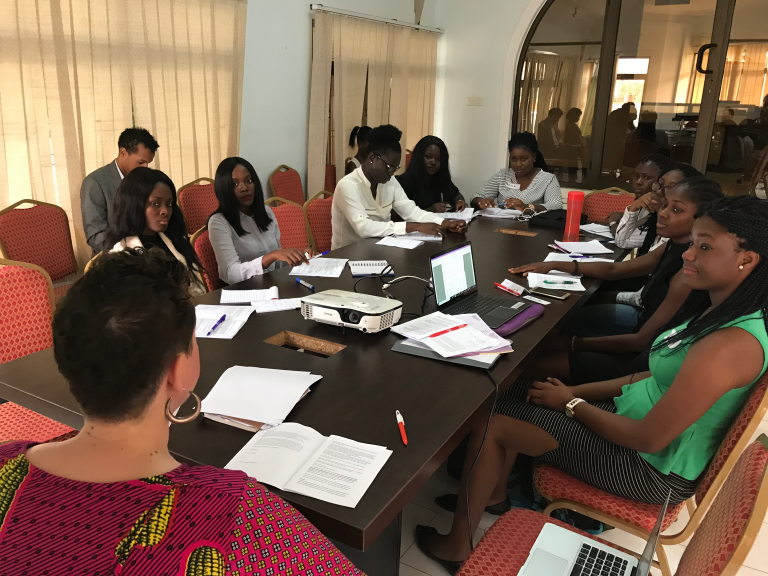
In the conference room with the students.
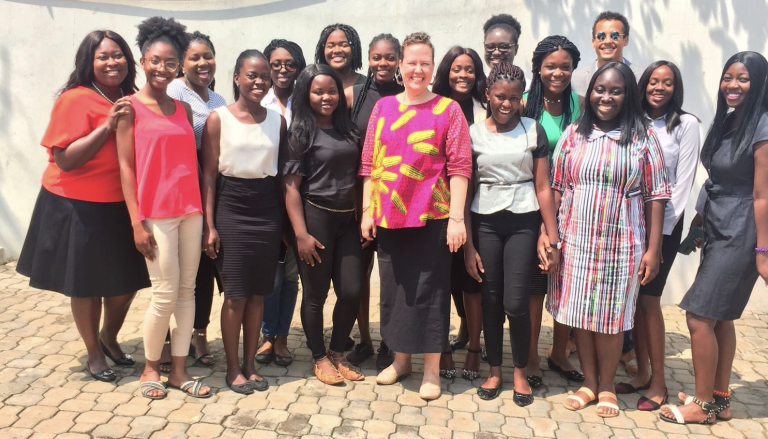
In the sun after our session!